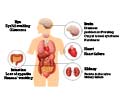Stiffening of the arteries appears to be associated with the progressive buildup of;-amyloid plaque in the brains of elderly patients without dementia, says a new research.

Background: Evidence suggested arterial stiffness is related to brain aging, cerebrovascular disease, impaired cognitive function and dementia in the elderly.
How the Study Was Conducted: The authors examined the association between arterial stiffness and change in Αβ deposition over time by using positron emission tomography (PET) of the brain to study 81 patients without dementia who were 83 years or older. Arterial stiffness was measured using pulse wave velocity (PWV) at various sites in the body.
Results: The proportion of patients with Αβ deposition increased from 48 percent at the start of the study to 75 percent at the two-year follow-up. Brachial-ankle PWV (a comparison of blood pressure in the upper arm and lower leg) was higher among patients with Αβ deposition at baseline and follow-up, while femoral-ankle PWV (a comparison of blood pressure in the upper leg and lower leg) was only higher in Αβ-positive patients at follow-up. The accumulation of Αβ over time was associated with greater central arterial stiffness. The authors acknowledge that while Αβ deposition and vascular stiffness appear to be associated, the mechanisms for this are not well established.
Discussion: "This study shows that arterial stiffness, as measured by PWV, is associated with the amount of Αβ in the brain and is an independent indicator of Αβ progression among nondemented elderly adults. … The exact mechanism linking arterial stiffness and Αβ deposition in the brain needs to be elucidated."
Advertisement









